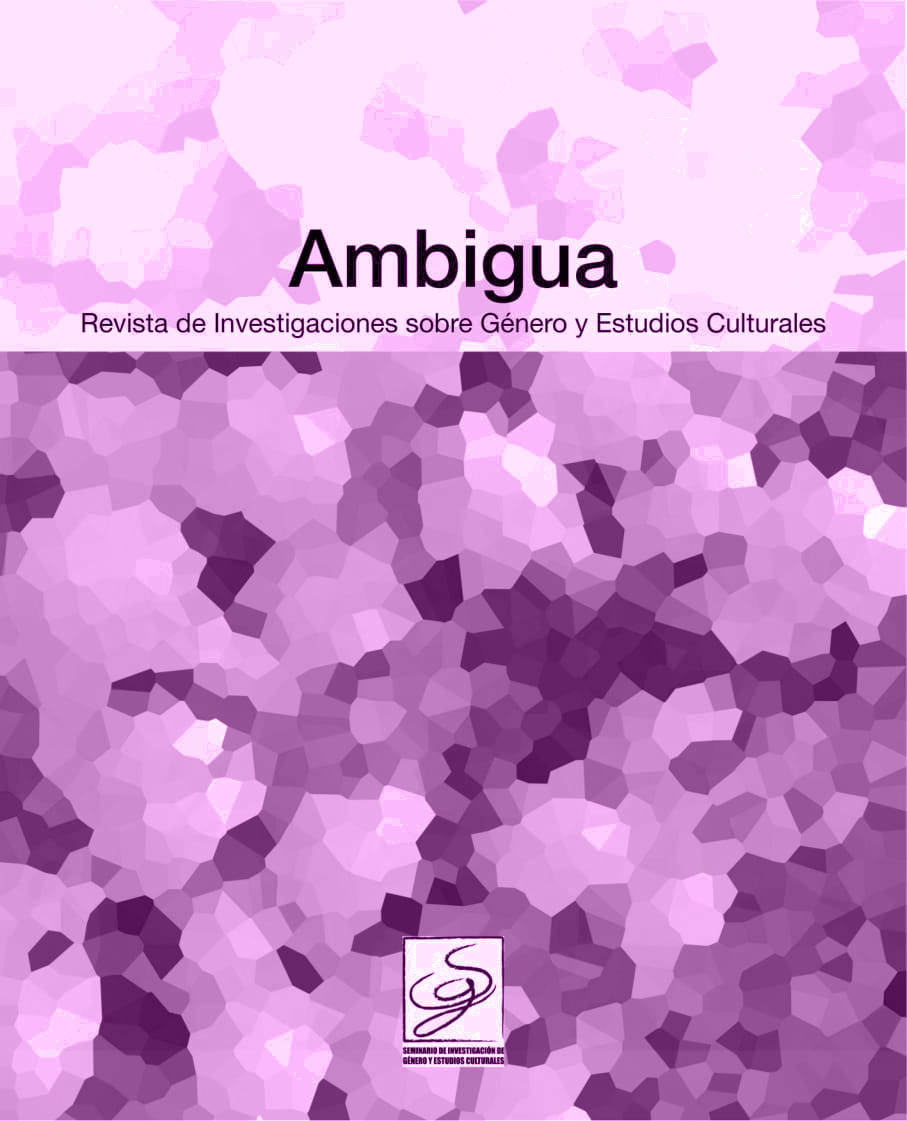Analysis of antipatriarchal discursive representations in literature through three works
matriarchy as an alternative form of exercising power
DOI:
https://doi.org/10.46661/ambigua.5181Keywords:
feminism, discourse, Gioconda Belli, Lysistrata , García Márquez, woman, literature, matriarchyAbstract
This paper sets out to analyze the presence of alternative literary representations to the classic canons of patriarchy and, specifically, search for texts where a matriarchal order is constructed as a subversive form of exercising power. The interpretive dimension of women as protagonists/participants of the literary narrative is the one that centers the analyses carried out, extracting the archetypal connotations of the characters that articulate the story and their own relationships, which constitutes a critical evidence of realities that transmit implicit knowledge to the reader about the social existence. Although literature generates a negotiated fiction, its critical reading should not be carried out outside those sociological categories that allow us to unravel the world. After reviewing some theoretical concepts on the ideas of matriarchy, patriarchy and feminist criticism, three works have specifically been selected as outstanding examples of how creative tools can serve female empowerment and the transformation of the collective imagination: Lysistrata, a comedy by Aristophanes; One Hundred Years of Solitude, the novel par excellence by Gabriel García Márquez and The Country of Women, by Nicaraguan Gioconda Belli, one of the most prominent feminist writers in contemporary literature written in Spanish. The three works are intimately connected and represent, in turn, a plausible (re) conceptualization of the feminine experience aligned with feminist theories of difference. This last issue allows us to invite the reader to return to one of the classic debates of the contemporary feminist movement: to renounce or to exalt gender, finding in it, rather than a violent and oppressive social construction, an opportunity to change the world from a new scale of values starring motherhood and care policy.
Downloads
References
ARISTÓFANES. Comedias III. Madrid: Gredos, 2007.
AVILA-FUENMAYOR, FRANCISCO. «El concepto de poder en Michel Foucault». TELOS. Revista de Estudios Interdisciplinarios en Ciencias Sociales, Vol. 8 (2): 215-234, 2006.
BEAUVOIR, SIMONE DE. El segundo sexo. Buenos Aires: Siglo Veinte, 1972.
BELLI, GIOCONDA. El país de las mujeres. Navarra: La Otra Orilla, 2010.
CASTRO SOLANO, ROSEMARY. «La vía utópica del ‘felicismo’: explorando “El país de las mujeres” de Gioconda Belli». Káñina. Revista de Artes y Letras, Universidad de Costa Rica XL (1) (enero-junio): 23-29, 2016.
CUEVA PERUS, MARCOS. «Machismo y gineocracia: la familia mexicana y latinoamericana como forma mixta». Intersticios Sociales. Número 3 (marzo-agosto): 1-28, 2012. Disponible en: http://148.202.248.171/colegiojal/index.php/is/article/view/28
ESTÉBANEZ-CALDERÓN, DEMETRIO. Breve diccionario de términos literarios. Madrid: Alianza, 2015.
FACIO, ALDA & FRIES, LORENA. «Feminismo, género y patriarcado». Academia. Año 3. (6) (primavera): 259-294, 2005.
FARIÑA BUSTO, MARÍA JESÚS & BEATRIZ SUÁREZ BRIONES. «La crítica literaria feminista, una apuesta por la modernidad». In Semiótica y modernidad: actas del V Congreso Internacional de la Asociación Española de Semiótica, La Coruña, 3-5 de diciembre de 1992, Vol. 1, 321-332, 1994.
GARCÍA MÁRQUEZ, GABRIEL. El olor de la guayaba. Larga entrevista de Plinio Apuleyo Mendoza. Buenos Aires: Editorial Sudamericana, 1994. Disponible en: https://yaxchel1.weebly.com/uploads/1/3/1/3/13139517/01_el_olor_de_la_guayaba__gabriel_garcia_marquez.pdf
GARCÍA MÁRQUEZ, GABRIEL. Cien años de soledad. Barcelona: Literatura Random
House, 2014.
GARCÍA NOVO, ELSA. «Mujeres al poder: una lectura de “Lisístrata”». Cuadernos de Filología Clásica (Estudios griegos e indoeuropeos), (1), 43-55, 1991.
GRAJERI, ELENA. «Los estudios sobre mujeres y los estudios de género». En Introducción a la literatura comparada, ARMANDO GNISCI, 441-482. Barcelona: Critica, 2007.
HAKIM, CATHERINE. Capital erótico. El poder de fascinar a los demás. Barcelona: Debate, 2012.
HERRERA MOLINA, LUIS CARLOS. «Gabriel García Márquez y la ética en “Cien años de soledad”». In Universitas Philosophica, 32(65), 245-274, 2015.
LEÓN RODRÍGUEZ, MARÍA ELENA. «Ética feminista y feminismo de la igualdad». Revista Espiga, (16-17), (enero-diciembre), 79-88, 2008.
LERNER, GERDA. La creación del patriarcado. Barcelona: Crítica, 1990.
LÓPEZ PÉREZ, JOSÉ ANTONIO. «Una lectura de la Lisístrata de Aristófanes». Synthesis 13, 11-48, 2006.
MARTÍN-CANO, FRANCISCA. «Estudio de las sociedades matrilineales (S.M.)». Nómadas. Critical Journal of Social and Juridical Sciences, Vol. 12, núm.2. Disponible en: https://www.redalyc.org/articulo.oa?id=181/18153295015
RODRÍGUEZ HERRANZ, ROSA & LUCÍA SERRANO MUÑOZ. «El concepto de matriarcado: una revisión crítica». In Arqueoweb 7(2) sept./dic, 2005. Disponible en: https://webs.ucm.es/info/arqueoweb/pdf/7-2/rodriguez.pdf
ROSSI, ANNUNZIATA. «J.J. Bachofen y el retorno de las Madres». Acta Poética, 30 (1), 273-293, 2009. Disponible en: http://www.scielo.org.mx/scielo.php?script=sci_arttext&pid=S0185-30822009000100010&lng=es&nrm=iso.
SUÁREZ BRIONES, BEATRIZ. «La Segunda Ola feminista: teorías y críticas literarias feministas» (25-39). In Escribir en femenino: poéticas y políticas, BEATRIZ SUÁREZ BRIONES, MARÍA BELÉN MARTÍN LUCAS y MARÍA JESÚS FARIÑA BUSTO (Eds.). Barcelona: Icaria Editorial, 2000.
VACCA, LUCRECIA & COPPOLECCHIA, FLORENCIA. «Una crítica feminista al derecho a partir de la noción de biopoder de Foucault». Páginas de Filosofía. Año XIII, núm.16, pp. 60-75.
VARGAS LLOSA, MARIO. García Márquez: Historia de un deicidio. Barcelona: Barral Editores, 1971.
VIVERO MARÍN, CÁNDIDA ELIZABETH. «De la teoría literaria feminista a la teoría queer». In Géneros. Revista de investigación y divulgación sobre los estudios de género 12, 73-83, 2012. Disponible en: http://bvirtual.ucol.mx/descargables/824_teoria_literaria_feminista_73-83.pdf
Downloads
Published
How to Cite
Issue
Section
License
Copyright (c) 2020 Maravillas Moreno Amor, José Miguel Rojo Martínez

This work is licensed under a Creative Commons Attribution-NonCommercial-ShareAlike 4.0 International License.
The authors agree with the following:
1. Authors retain copyright and grant the journal right of first publication with the work simultaneously licensed under a license Attribution-NonCommercial-ShareAlike 4.0 International (CC BY-NC-SA 4.0) that allows others to share the work with an acknowledgement of the work's authorship and initial publication in this journal.
2. Authors are able to enter into separate, additional contractual arrangements for the non-exclusive distribution of the journal's published version of the work (e.g., post it to an institutional repository or publish it in a book), with an acknowledgement of its initial publication in this journal.
3. Authors are permitted and encouraged to post their work online (e.g., in institutional repositories or on their website) prior to and during the submission process, as it can lead to productive exchanges, as well as earlier and greater citation of published work (See The Effect of Open Access).









